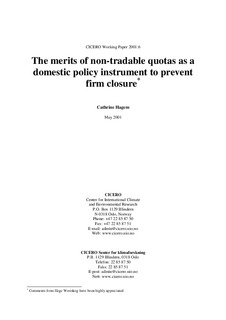The merits of non-tradable quotas as a domestic policy instrument to prevent firm closure
Working paper
Permanent lenke
http://hdl.handle.net/11250/192386Utgivelsesdato
2001Metadata
Vis full innførselSamlinger
- CICERO Working Papers [167]
Sammendrag
There is a concern in many countries that a domestic tradable quota system for greenhouse gases, where all emitters must pay for their quotas, may lead to closures of emissions-intensive industrial companies. Allocating quotas free of charge to companies operating in competitive markets has been suggested as a means to reduce the likelihood of closures. Two different designs of quota systems are studied within a two-period model: one where the quotas given free of charge are tradable, and one where the quotas are non-tradable. The two quota systems are compared with respect to their ability both to induce the firms to implement investment in abatement technology and to prevent or postpone closures.
